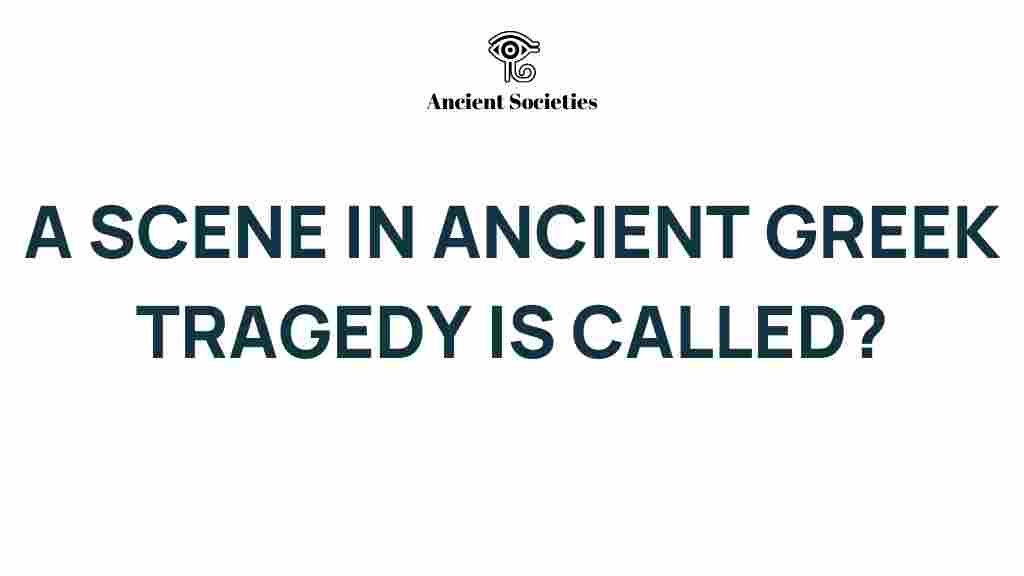Unveiling the Dramatic Essence of Ancient Greek Tragedy
Ancient Greek tragedy is not merely a form of entertainment; it is a profound reflection of human existence, societal values, and cultural heritage. This dramatic form, which flourished in the 5th century BCE, has left an indelible mark on the landscape of literature and performance art. By exploring the intricate elements of Greek tragedy, we can uncover the storytelling techniques, thematic depth, and historical influence that continue to resonate in contemporary drama.
The Origins of Greek Tragedy
Greek tragedy emerged from the rituals honoring Dionysus, the god of wine and fertility. These early performances were part of the annual festival, the Dionysia, held in Athens. The transition from choral hymns to structured narratives marked the birth of this dramatic form. Key figures, such as Aeschylus, Sophocles, and Euripides, would shape its evolution, introducing complex characters and moral dilemmas.
Understanding the Dramatic Structure
The structure of Greek tragedy is pivotal to its storytelling. Typically, a play is divided into several parts:
- Prologue: The opening scene that sets the stage for the story.
- Parodos: The entrance of the chorus, which often provides background information.
- Episodes: The main action segments where characters develop the plot.
- Stasimon: Choral odes reflecting on the action that has occurred.
- Exodus: The concluding scene that resolves the story.
This structure enhances the dramatic tension and allows for a deep exploration of themes such as fate, justice, and the human condition.
Key Themes in Greek Tragedy
Greek tragedy often revolves around universal themes that resonate through time:
- Fate vs. Free Will: Many tragedies explore the tension between human agency and predestined outcomes.
- Hubris: Excessive pride often leads to a character’s downfall, serving as a cautionary tale.
- Tragic Flaw: The protagonist’s inherent flaw that contributes to their tragic end.
- Consequences of Actions: The moral implications of one’s choices are a central focus.
These themes not only engage audiences but also provoke thought about moral and ethical dilemmas faced in life.
The Role of the Chorus
The chorus plays a crucial role in Greek tragedy. It serves multiple functions:
- Commentary: The chorus offers insights and reflections on the events of the play.
- Emotional Connection: It helps convey the emotional landscape of the story, guiding audience reactions.
- Social Reflection: The chorus often embodies societal norms and values, providing a voice for the community.
Through its lyrical odes, the chorus deepens the audience’s engagement with the narrative.
Historical Influence of Greek Tragedy
The impact of Greek tragedy on Western literature and performance art is profound. Its legacy can be seen in various forms:
- Literature: Many playwrights, including Shakespeare and Racine, drew inspiration from Greek tragedies.
- Modern Drama: The structure and themes of Greek tragedy continue to influence contemporary playwrights.
- Film and Television: Elements of Greek tragedy are prevalent in modern storytelling across various media.
Moreover, the exploration of human emotions and ethical dilemmas remains relevant, proving that the essence of Greek tragedy transcends time.
Performing Greek Tragedy Today
Modern adaptations of Greek tragedy strive to retain the original’s emotional intensity while making it accessible to contemporary audiences. Here are some key considerations for performing Greek tragedy today:
- Authenticity: Strive to maintain the integrity of the original text while making it relatable.
- Interpretation: Directors often introduce unique interpretations that resonate with current societal issues.
- Visual Elements: Modern staging techniques can enhance the dramatic experience through innovative set designs and lighting.
Engaging with these elements can breathe new life into ancient stories, making them relevant for today’s audiences.
Challenges and Troubleshooting
When exploring Greek tragedy, one may encounter various challenges:
- Language Barrier: Understanding the original text can be difficult for modern audiences. Consider using accessible translations.
- Cultural Context: Some themes may require contextualization for contemporary audiences to relate to them.
- Performance Style: The stylized acting of ancient theater may seem foreign. Incorporating modern acting techniques can bridge this gap.
By addressing these challenges, we can ensure that the rich legacy of Greek tragedy continues to be appreciated and understood.
The Cultural Heritage of Greek Tragedy
Greek tragedy is an integral part of our cultural heritage. Its exploration of the human condition, complex characters, and moral quandaries has inspired countless works of art and literature. Recognizing and preserving this art form is vital for future generations.
For those interested in delving deeper into the significance of Greek tragedy, consider visiting resources such as the National Theatre for performances and discussions on ancient theater.
Conclusion
In conclusion, the dramatic essence of ancient Greek tragedy offers a rich tapestry of storytelling that continues to influence modern drama and performance art. Its unique dramatic structure, compelling themes, and cultural heritage provide a foundation for exploring the complexities of human experience. By embracing the lessons of Greek tragedy, we can enhance our understanding of literature, art, and the timeless nature of the human condition. The legacy of Greek tragedy remains not just in the past but as a vibrant part of our ongoing storytelling tradition.
For more insights into the world of drama and theater, visit our blog for updates on literature and performance art.
This article is in the category Culture and created by AncientSocieties Team
